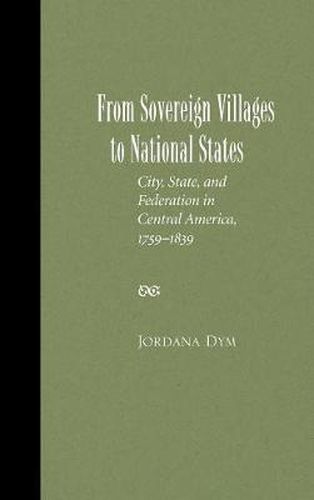From Sovereign Villages to National States: City, State, and Federation in Central America, 1759-1839
Jordana Dym

From Sovereign Villages to National States: City, State, and Federation in Central America, 1759-1839
Jordana Dym
This title is printed to order. This book may have been self-published. If so, we cannot guarantee the quality of the content. In the main most books will have gone through the editing process however some may not. We therefore suggest that you be aware of this before ordering this book. If in doubt check either the author or publisher’s details as we are unable to accept any returns unless they are faulty. Please contact us if you have any questions.
The role of the city - as an institution, as a political ideal, as a training ground for politicians - has been neglected in historical studies of Spanish American independence. Connecting the political changes of the Bourbon Reforms (1759-1788) and constitutional monarchy (1808-1821) to those of the independence era (1821-1839), Jordana Dym’s analysis of Central America’s early nineteenth-century politics shows nation-state formation to be a city-driven process that transformed colonial provinces (weak administrative districts with ambiguous political identities and divided interiors) into enduring states with basic governments and articulated national identities. Dym argues that in Central America, an important aspect of the nineteenth-century political revolution was a shift from European political ideology based on municipal sovereignty (that of the pueblos) to a politics of national sovereignty (that of the pueblo). The tensions in the move from municipal to national sovereignty, she finds, contributed to multiple civil wars and to the difficulty of bringing breakaway regions to respect colonial districts and capitals. This book challenges the received wisdom that states emerged, already formed, from the process of independence. Based on extensive research in national and local archives in Central America, the United States, and Europe, this political history examines a complex process that takes into account cooperation as well as conflict between elites and popular groups. It holds that the contradictory, multifaceted republican processes of independence and subsequent efforts at state formation owed much to and must be analysed within the context of the specific types of political change introduced in the late colonial period, a question of interest to scholars and students of Central America, Mexico, and South America.
This item is not currently in-stock. It can be ordered online and is expected to ship in 7-14 days
Our stock data is updated periodically, and availability may change throughout the day for in-demand items. Please call the relevant shop for the most current stock information. Prices are subject to change without notice.
Sign in or become a Readings Member to add this title to a wishlist.


